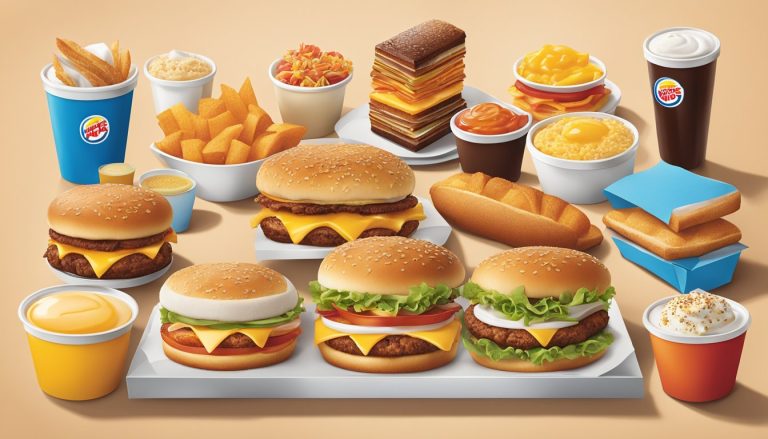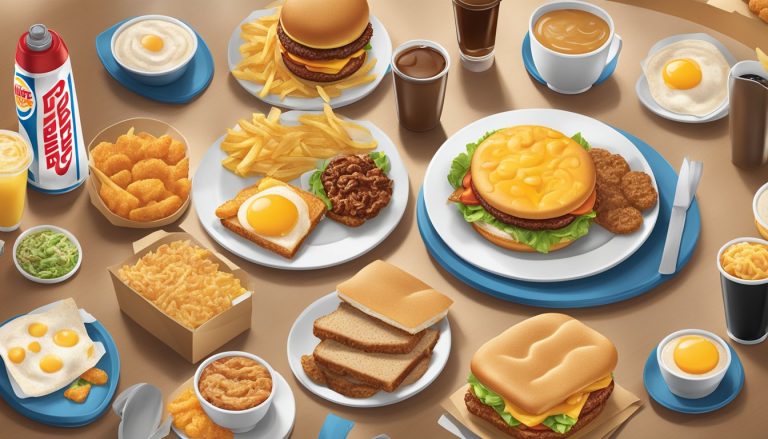Burger King‘s journey into all-day breakfast marks a significant shift in the fast food industry. For decades, breakfast items were confined to morning hours, but consumer demand has pushed chains to expand their offerings.
Burger King now serves breakfast all day at select locations, adapting to changing customer preferences and lifestyle needs. This move follows similar initiatives by competitors like McDonald’s, who introduced all-day breakfast in 2015.
The rise of all-day breakfast at Burger King reflects broader trends in the fast food sector. As consumers seek more flexible dining options, chains are adjusting their menus and service hours. This shift not only caters to late risers and night owls but also opens up new revenue streams for fast food giants in an increasingly competitive market.
The Evolution of Breakfast at Burger King
Burger King’s breakfast offerings have undergone significant changes since their introduction. The fast food giant has adapted its morning menu and hours to meet shifting consumer demands and compete in the breakfast market.
Historical Breakfast Offerings
Burger King entered the breakfast scene in 1979, following McDonald’s lead in targeting morning customers. Their initial breakfast menu featured simple, convenient items designed for on-the-go consumption. The Croissan’wich became a signature breakfast item, combining a croissant with traditional breakfast sandwich fillings.
Other popular offerings included pancakes and French toast sticks, catering to those with a sweet tooth. Burger King’s breakfast menu aimed to provide quick, tasty options for busy commuters and families rushing to start their day.
Adapting to Changing Lifestyles
As consumer lifestyles evolved, Burger King adjusted its breakfast strategy. The rise of all-day breakfast culture prompted the chain to reconsider its traditional morning-only approach.
Recognizing that many customers desired breakfast foods beyond conventional morning hours, Burger King began experimenting with extended breakfast times. This shift aimed to accommodate late risers, night shift workers, and those simply craving breakfast items later in the day.
Burger King Breakfast Hours Expansion
Initially, Burger King served breakfast until 10:30 AM, mirroring the industry standard. However, to meet changing consumer preferences and compete with rivals, the chain expanded its breakfast hours.
In a significant move, Burger King introduced all-day breakfast at many locations. This expansion allowed customers to enjoy popular items like the Croissan’wich, pancakes, and French toast sticks throughout the day.
The extended breakfast hours provided greater flexibility for customers and helped Burger King capture a larger share of the breakfast market. This move also aligned with the growing trend of breakfast foods being consumed at non-traditional times.
Comparison With Competitors
Burger King’s breakfast offerings face stiff competition from other major fast food chains. Each brand has its own unique approach to the morning meal market.
Burger King vs. McDonald’s Breakfast
McDonald’s dominates the fast food breakfast scene. The Golden Arches captured 35.4% of morning fast food visits in 2023. McDonald’s all-day breakfast menu gives it a significant edge over Burger King.
Burger King typically stops serving breakfast at 10:30 AM. This limits their ability to compete with McDonald’s extended breakfast hours. However, some Burger King locations have experimented with serving select breakfast items all day.
The Egg McMuffin remains McDonald’s signature breakfast item. Burger King counters with its own line of breakfast sandwiches and croissants.
How Burger King Stands Out From Wendy’s and Other Fast Food Chains
Burger King differentiates itself through unique menu items. Their breakfast menu features flame-grilled patties, a nod to their signature cooking method.
Wendy’s has struggled to gain traction in the breakfast market. This gives Burger King an opportunity to solidify its position as the second-largest fast food breakfast provider.
Taco Bell offers a non-traditional breakfast menu with Mexican-inspired items. Burger King maintains a more classic American breakfast selection.
Burger King’s breakfast pricing tends to be competitive with other chains. They frequently run promotions to attract cost-conscious morning customers.
Expanding the Morning Menu

Burger King has significantly broadened its breakfast offerings to appeal to a wider range of tastes and preferences. The fast food chain now provides an array of options beyond its classic fare.
Introduction of New Breakfast Options
Burger King introduced the Croissan’Wich in 1983, revolutionizing its breakfast menu. This croissant-based sandwich became a cornerstone of their morning offerings. In recent years, they’ve added more diverse items to cater to changing consumer demands.
Breakfast burritos joined the menu, providing a handheld option packed with eggs, cheese, and meat. These offer a flavorful alternative for those seeking a different texture and taste profile.
Pancakes also made their debut, giving customers a sweeter breakfast choice. Served with syrup, they appeal to those with a morning sweet tooth.
Variety and Innovation in Breakfast Items
Burger King continues to innovate its breakfast menu. They’ve introduced healthier options like oatmeal to cater to health-conscious customers.
The chain has also experimented with limited-time offerings to keep the menu fresh and exciting. These special items often feature unique flavor combinations or seasonal ingredients.
Burger King’s breakfast menu now includes:
- Classic sandwiches (Croissan’wich, biscuit sandwiches)
- Breakfast burritos
- Pancakes
- Oatmeal
- French toast sticks
- Hash browns
This variety ensures there’s something for everyone, from those seeking a hearty meal to those preferring a lighter start to their day.
Analyzing the All-Day Breakfast Phenomenon

All-day breakfast has transformed the fast food landscape, meeting consumer demands and reshaping traditional meal schedules. This shift has significant implications for sales and customer satisfaction.
Consumer Demand for Breakfast Beyond Morning Hours
Breakfast foods have gained popularity outside of traditional morning hours. Many customers crave eggs, pancakes, and other breakfast items throughout the day. This trend reflects changing work schedules and lifestyles.
Convenience plays a crucial role in the appeal of all-day breakfast. Consumers appreciate the flexibility to enjoy their favorite morning meals at any time. This option caters to night shift workers, late risers, and those with non-traditional schedules.
The variety offered by breakfast menus also contributes to their appeal. Lighter options like yogurt parfaits and heartier choices such as breakfast sandwiches provide diverse selections for different tastes and dietary needs.
Impact on Sales and Customer Satisfaction
All-day breakfast has proven to be a significant driver of sales for fast food chains. McDonald’s reported a 5.7% increase in U.S. sales during the first quarter after introducing all-day breakfast in 2015.
Customer satisfaction has also improved with the availability of breakfast items throughout the day. Surveys indicate that consumers feel more positively about brands offering this option.
The expanded menu has attracted new customers and increased visit frequency among existing patrons. Some chains have seen a boost in afternoon and evening traffic due to all-day breakfast offerings.
However, implementing all-day breakfast can present operational challenges. Restaurants must manage additional inventory and adjust kitchen workflows to accommodate both breakfast and regular menu items simultaneously.
Logistics and Operational Challenges

Implementing all-day breakfast at Burger King presents significant logistical hurdles and operational complexities. The fast food giant must overcome challenges related to kitchen workflow, equipment usage, and inventory management to successfully offer breakfast items throughout the day.
Menu Item Availability and Restaurant Workflow
Burger King locations need to reconfigure their kitchen spaces to accommodate breakfast and lunch prep simultaneously. This involves installing additional griddles and toasters to handle increased demand for eggs and buns. Staff require cross-training to prepare both breakfast and regular menu items efficiently.
Maintaining food quality becomes more challenging with extended hours. Eggs and breakfast meats have shorter hold times than traditional burgers. Burger King must develop new procedures to ensure freshness without slowing down service.
Some locations may need to limit certain breakfast offerings during peak lunch and dinner periods to maintain operational efficiency. This could involve a streamlined all-day breakfast menu focused on popular items like breakfast sandwiches and hash browns.
Supply Chain Considerations for Extended Hours
Offering breakfast items all day increases complexity in Burger King’s supply chain. Restaurants need larger inventories of breakfast ingredients, requiring more frequent deliveries and expanded storage capacity.
Burger King must work closely with suppliers to ensure consistent availability of key breakfast components like eggs, bacon, and English muffins. This may involve renegotiating contracts or finding additional suppliers to meet increased demand.
Forecasting becomes more challenging with all-day breakfast. Burger King needs to develop new predictive models to accurately estimate ingredient usage throughout the day. This helps prevent shortages and reduces food waste.
Food costs for breakfast items may increase due to higher volumes and potential supply constraints. Burger King must carefully balance pricing to maintain profitability while keeping breakfast offerings competitive.
Menu Highlights and Fan-Favorites
Burger King’s breakfast menu features several popular items that have become customer favorites. These dishes range from hearty sandwiches to sweet treats, offering options to satisfy various tastes.
Signature Dishes and Their Popularity
The Croissan’wich stands out as one of Burger King’s most iconic breakfast items. This sandwich combines a flaky croissant with eggs, cheese, and a choice of meat. The Egg and Cheese Croissan’wich is a vegetarian-friendly option.
Hash Browns are another fan-favorite. These crispy, golden potato bites complement any breakfast meal or serve as a tasty standalone snack.
French Toast Sticks offer a sweet option for those with a morning sugar craving. Served warm and golden brown, they come with a side of syrup for dipping.
Comparison of Breakfast Sandwiches and Platters
Burger King’s breakfast sandwiches come in various styles. The classic Sausage, Egg & Cheese Biscuit provides a hearty start to the day. For a lighter option, the Bacon, Egg & Cheese Muffin offers a balance of flavors.
The Breakfast Platter caters to those seeking a more substantial meal. It typically includes scrambled eggs, hash browns, and a choice of meat. This option provides more variety than individual sandwiches.
Nutritionally, breakfast sandwiches tend to be more portable and lower in calories. Platters offer larger portions and more diverse ingredients, but generally contain higher calorie counts.
Nutritional Information and Dietary Options

Burger King’s all-day breakfast menu offers a range of options with varying nutritional profiles. Consumers can make informed choices based on calorie content, ingredient transparency, and healthier alternatives available.
Healthier Choices in Breakfast Dishes
Oatmeal stands out as a nutritious option on Burger King’s breakfast menu. It provides fiber and essential nutrients, making it a smart choice for health-conscious diners.
For protein seekers, breakfast burritos can be a satisfying option. These wraps often contain eggs and lean meats, offering a balance of protein and carbohydrates.
Lower-calorie alternatives include egg and cheese sandwiches on biscuits or English muffins. These items provide protein without excessive calories.
Customers looking to reduce sodium intake can opt for items without bacon or sausage.
Caloric Content and Ingredient Transparency
Burger King provides detailed nutritional information for its breakfast items. A basic hamburger contains 250 calories, the lowest among meal options.
Calorie counts vary widely across the menu:
- French toast sticks with syrup: Lower in calories but also low in protein
- Croissant sandwiches: Higher in calories and fat
- Hash browns: Moderate calorie content, but higher in fat
Burger King offers an online nutrition calculator, allowing customers to customize orders and view nutritional details. This tool helps diners make choices aligned with their dietary goals.
The chain also lists allergen information, enabling those with food sensitivities to make safe selections.
Pricing and Value Deals

Burger King’s breakfast menu offers a range of affordable options to suit different budgets and appetites. Prices for individual items typically range from $1.00 to $4.49, making it accessible for most customers.
The Value Menu features budget-friendly choices like the Sausage Biscuit at $1.00 and the Sausage Burrito at $1.19. These items provide a quick and economical breakfast option for those on the go.
For those seeking a more substantial meal, Breakfast Combo Meals include small hash browns and a small coffee. These combos offer better value compared to purchasing items separately.
Burger King occasionally runs promotional deals, such as limited-time $5 breakfast bundles. While these specific offers may not be currently available, the chain frequently introduces new value promotions.
The Breakfast Kids Menu includes options like Maple Flavor Oatmeal, Milk & Apple Slices for $4.49, catering to younger customers with balanced meal choices.
Prices may vary slightly by location, so customers are advised to check with their local Burger King for the most accurate and up-to-date pricing information.
Customer Experience and Convenience
Burger King’s introduction of all-day breakfast marks a significant shift in their approach to customer service. This move aligns with the growing demand for breakfast items beyond traditional morning hours.
By offering popular breakfast options throughout the day, Burger King enhances convenience for customers with non-traditional schedules. Shift workers, students, and late risers can now enjoy breakfast favorites at any time.
The expansion of breakfast hours also increases menu variety. Customers have more choices, allowing them to satisfy specific cravings regardless of the time of day.
Fast food breakfast has become a competitive arena among major chains. Burger King’s all-day breakfast helps them stay relevant in this space.
To streamline the customer experience, Burger King has integrated technology:
- Mobile ordering through their app
- Self-service kiosks in restaurants
- Personalized recommendations based on order history
These innovations reduce wait times and simplify the ordering process. Customers can customize their meals more easily, living up to the brand’s “Have It Your Way” slogan.
The move towards all-day breakfast also reflects changing consumer habits. As meal times become more flexible, Burger King adapts to meet these evolving needs.
By prioritizing convenience and expanding options, Burger King aims to improve customer satisfaction and loyalty. This strategy could potentially increase foot traffic and boost sales across all dayparts.
Future Trends in Fast Food Breakfast

Fast food breakfast is evolving rapidly, with chains expanding their morning menus and experimenting with new flavors and formats. Consumer preferences are shifting towards healthier options and all-day availability.
Predictions for Breakfast Menus
Plant-based alternatives are expected to gain prominence on fast food breakfast menus. Chains may introduce more egg substitutes and meatless sausage options to cater to health-conscious and vegan customers.
Global flavors will likely influence future breakfast offerings. Mexican-inspired breakfast tacos and Asian-inspired morning rice bowls could become staples at major chains.
All-day breakfast may make a comeback. While some chains scaled back during the pandemic, consumer demand for breakfast items throughout the day remains strong.
Potential Innovations in Morning Offerings
Customization is set to play a bigger role in fast food breakfast. Build-your-own breakfast sandwich bars and personalized smoothie stations may become common features.
Digital ordering and delivery for breakfast items will likely expand. Chains may develop specialized packaging to keep hot breakfast foods fresh during delivery.
Portable, handheld breakfast items are expected to grow in popularity. Breakfast wraps, bite-sized egg dishes, and innovative formats like breakfast “sushi rolls” could emerge.
Functional ingredients may be incorporated into morning menus. Chains might add foods with probiotics, adaptogens, or other health-boosting components to appeal to wellness-focused consumers.




